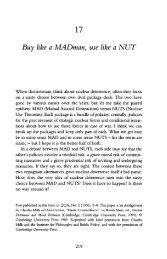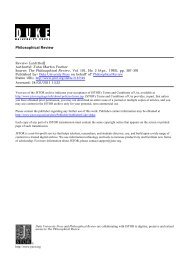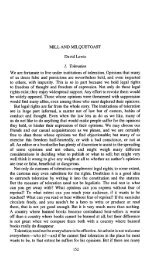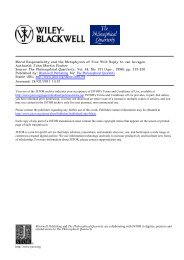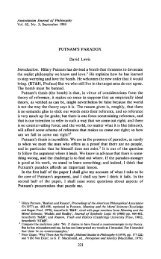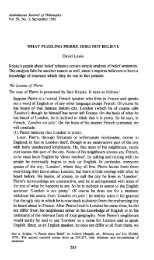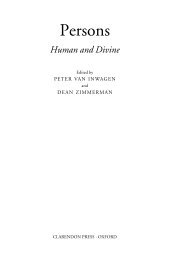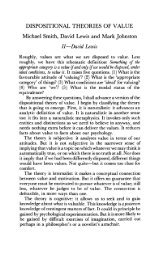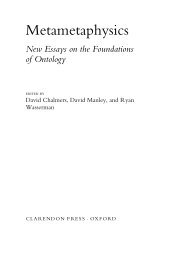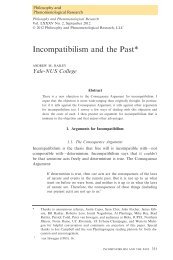Tooley and Evil - Andrew M. Bailey
Tooley and Evil - Andrew M. Bailey
Tooley and Evil - Andrew M. Bailey
- No tags were found...
You also want an ePaper? Increase the reach of your titles
YUMPU automatically turns print PDFs into web optimized ePapers that Google loves.
Downloaded by [University of Notre Dame] at 11:51 14 April 201268 <strong>Tooley</strong> <strong>and</strong> <strong>Evil</strong>: A Reply(6) If God has strongly actualised T, then Curley would have accepted thebribe;<strong>and</strong> if (5) is true, then so is(7) If God had strongly actualised T then Curley would not have acceptedthe bribe.I then argued for two theses:(8) If (6) is true, then God could not have weakly actualised W* (that is, if(6) is true, then there is no state of affairs C such that God could havestrongly actualised C <strong>and</strong> such that if he had strongly actualised C, thenW* would have been actual), <strong>and</strong>(9) If (7) is true, then God could not have weakly actualised W.(The argument for (8) <strong>and</strong> (9) is to be found on pp. 181-182). Accordingly, if(6) is true, then God could not have weakly actualised W*; if (7) is true, hecould not have weakly actualised W; so either way there is at least one possibleworld God could not have weakly actualised. Furthermore, since strongactualisation is a special case of weak actualisation, it follows that there arepossible worlds God could not have actualised, either weakly or strongly.Now <strong>Tooley</strong> objects as follows:Plantinga's argument here is simply fallacious. For suppose that it is true thatif God had strongly actualised T, then Curley would have accepted the bribe.How does it follow that God could not actualise W*? The answer is that itdoes not follow, since none of the premises rule out the possibility that whileGod can strongly actualise T, he can also weakly actualise Twithout stronglyactualising it. And it may be the case that if God were to (merely) weaklyactualise T, then Curley would reject the bribe. So the premises do no!preclude the possibility that God can bring about W by strongly actualisingT, <strong>and</strong> W* by weakly actualising, but not strongly actualising, T. (p. 367)It isn't easy to take this objection seriously. <strong>Tooley</strong> claims that perhaps Godcould have weakly actualised W* by weakly actualising T but not stronglyactualising it. But what I argued was that there are possible worlds in which Godactualises the very same states of affairs as he does in IV, <strong>and</strong> in which Curleydoes not take the bribe; <strong>and</strong> I proposed to let' W*' denote any such world. Byhypothesis, then, W* is one of the possible worlds in which God stronglyactualises the very same states of affairs as he does in IV. T (by hypothesis) isthe largest state of affairs God strongly actualises in W; it is therefore one of thestates of affairs he does strongly actualise in IV, <strong>and</strong> hence is one of the states ofaffairs he strongly actualises in W*. By hypothesis, therefore, W* includesGod's strongly actualising T. But then to suggest that God could perhapsweakly actualise W by weakly but not strongly actualising T is to fall intoegregious confusion; any world in which God does not strongly actualise T isnot W*. One way for God to ensure that W* is not actual is to refrain fromstrongly actualising T.




